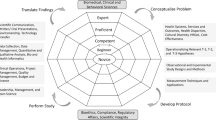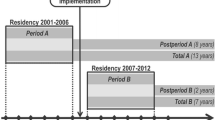Abstract
Background
To increase the number of clinician scientists and to improve research skills, a number of clinical research training programs have been recently established. However, controlled studies assessing their effectiveness are lacking.
Objective
To investigate the effectiveness of a 1-year resident training program in clinical research.
Design
Controlled before-and-after study. The training program included a weekly class in clinical research methods, completion of a research project, and mentorship.
Participants
Intervention subjects were 15 residents participating in the 1-year training program in clinical research. Control subjects were 22 residents not participating in the training program.
Measurements and Main Results
Assessments were performed at the beginning and end of the program. Outcomes included methodological research knowledge (multiple-choice progress test), self-assessed research competence, progress on publications and grant applications, and evaluation of the program using quantitative and qualitative methods.
Results
Intervention subjects and controls were well matched with respect to research experience (5.1 ± 2.2 vs 5.6 ± 5.8 years; p = .69). Methodological knowledge improved significantly more in the intervention group compared to the control group (effect size = 2.5; p < .001). Similarly, self-assessed research competence increased significantly more in the intervention group (effect size = 1.1; p = .01). At the end of the program, significantly more intervention subjects compared to controls were currently writing journal articles (87% vs 36%; p = .003). The intervention subjects evaluated the training program as highly valuable for becoming independent researchers.
Conclusions
A 1-year training program in clinical research can substantially increase research knowledge and productivity. The program design makes it feasible to implement in other academic settings.
Similar content being viewed by others
References
Wyngaarden JB. The clinical investigator as an endangered species. N Engl J Med. 1979;301:1254–9.
Schrier RW. Ensuring the survival of the clinician-scientist. Acad Med. 1997;72:589–94.
Nathan DG. Careers in translational clinical research—historical perspectives, future challenges. JAMA. 2002;287:2424–7.
Nathan DG. The several Cs of translational clinical research. J Clin Invest. 2005;115:795–7.
Association of American Medical Colleges (AAMC). Promoting translational and clinical science: the critical role of medical schools and teaching hospitals. Report of the AAMC’s task force II on clinical research. Washington, DC: Association of American Medical Colleges; 2006.
Phillipson EA. Is it the clinician-scientist or clinical research that is the endangered species? Clin Invest Med. 2002;25:23–5.
Khadaroo RG, Rotstein OD. Are clinician-scientists an endangered species? Barriers to clinician-scientist training. Clin Invest Med. 2002;25:260–1.
Sung NS, Crowley WF, Genel M, et al. Central challenges facing the national clinical research enterprise. JAMA. 2003;289:1278–87.
Solomon SS, Tom SC, Pichert J, Wasserman D, Powers AC. Impact of medical student research in the development of physician-scientists. J Investig Med. 2003;51:149–56.
Gallin EK, Le Blancq SM. Launching a new fellowship for medical students: the first years of the Doris Duke Clinical Research Fellowship Program. J Investig Med. 2005;53:73–81.
Mark AL, Kelch RP. Clinician scientist training program: a proposal for training medical students in clinical research. J Investig Med. 2001;49:486–90.
Hebert RS, Levine RB, Smith CG, Wright SM. A systematic review of resident research curricula. Acad Med. 2003;78:61–8.
Hartmann M, Wild B, Herzog W, et al. Der klinische Forscher in der psychosozialen Medizin: status, Kompetenzen und Leistungen [Working as a clinician-scientist in psychosocial medicine: Status, skills and research productivity]. Psychother Psychosom Med Psychol. 2007 (in press).
Phillipson EA. Clinical/research residency programs for the clinician scientist. Clin Invest Med. 1997;20:259–60.
Centre for Higher Education (CHE) and DIE ZEIT. Centre for Higher Education (CHE) / DIE ZEIT university ranking. Available at: http://www.daad.de/deutschland/hochschulen/hochschulranking/06544.en.html. Accessed July 27, 2007.
Deutsche Forschungsgemeinschaft. DFG Förder-Ranking Medizin 2003. [German Research Foundation: research funding ranking]. Available at: http://www.dfg.de/ranking/archiv/ranking2003/institutionen/Wc879d5f312ae.html. Accessed July 6, 2007.
Focus Online. Focus Uni-ranking 2007. Available at: http://www.focus.de/wissen/campus/hochschulen. Accessed July 27, 2007.
Healy C, Welchert A. Mentoring relations: a definition to advance research and practice. Educ Res. 1990;19:17–21.
Ramani S, Gruppen L, Kachur EK. Twelve tips for developing effective mentors. Med Teach. 2006;28:404–8.
Epstein RM. Assessment in medical education. N Engl J Med. 2007;356:387–96.
McCoubrie P. Improving the fairness of multiple-choice questions: a literature review. Med Teach. 2004;26:709–12.
Glaser R. Education and thinking: the role of knowledge. Am Psychol. 1984;39:193–202.
Wass V, Van der Vleuten C, Shatzer J, Jones R. Assessment of clinical competence. Lancet. 2001;357:945–9.
Downing S. Assessment of knowledge with written test formats. In: Norman G, Van der Vleuten C, Newble D, eds. International Handbook of Reserach in Medical Education, Vol. 2. Dordrecht: Kluwer; 2002:647–2.
Miller GE. The assessment of clinical skills/competence/performance. Acad Med. 1990;65:S63–7.
Stagnaro-Green AS, Downing SM. Use of flawed multiple-choice items by the New England Journal of Medicine for continuing medical education. Med Teach. 2006;28:566–8.
Haladyna T. Developing and validating multiple choice test items. 3rd Ed. Mahwah, NJ: Lawrence Erlbaum Associates; 2002.
Verhoeven BH, Snellen-Balendong HA, Hay IT, et al. The versatility of progress testing assessed in an international context: a start for benchmarking global standardization? Med Teach. 2005;27:514–20.
Barbour RS. Making sense of focus groups. Med Educ. 2005;39:742–50.
Hauer KE, Teherani A, Dechet A, Aagaard EM. Medical students’ perceptions of mentoring: a focus-group analysis. Med Teach. 2005;27:732–4.
Rademakers J, Ten Cate TJ, Bar PR. Progress testing with short answer questions. Med Teach. 2005;27:578–82.
Vickers AJ. The use of percentage change from baseline as an outcome in a controlled trial is statistically inefficient: a simulation study. BMC Med Res Methodol. 2001;1:6.
Vickers AJ. Analysis of variance is easily misapplied in the analysis of randomized trials: a critique and discussion of alternative statistical approaches. Psychosom Med. 2005;67:652–5.
Hulley SB, Cummings SR, Browner WS, Grady D, Hearst N, Newman TB. Designing clinical research. An epidemiologic approach. 2nd ed. Philadelphia: Lippincott; 2001.
Cohen J. Statistical power analysis for the behavioral sciences. 2nd ed. Hillsdale, NJ: Lawrence Earlbaum Associates; 1988.
DeHaven MJ, Wilson GR, O’Connor-Kettlestrings P. Creating a research culture: what we can learn from residencies that are successful in research. Fam Med. 1998;30:501–7.
Schultz HJ. Research during internal medicine residency training: meeting the challenge of the Residency Review Committee. Ann Intern Med. 1996;124:340–2.
Gill S, Levin A, Djurdjev O, Yoshida EM. Obstacles to residents’ conducting research and predictors of publication. Acad Med. 2001;76:477.
Kroenke K. Conducting research as a busy clinician-teacher or trainee. Starting blocks, hurdles, and finish lines. J Gen Intern Med. 1996;11:360–5.
Acknowledgment
We thank the intervention and control subjects who made this study possible. The first author gratefully acknowledges the opportunity to participate in the “Clinical Investigator Training Enhancement (CITE) Program” of the Regenstrief Institute, Indiana University, Indianapolis, during a research fellowship funded by the Max-Kade-Foundation, New York, and the German Research Foundation (DFG) in 2003/2004.
Conflict of Interest Statement
None disclosed.
Author information
Authors and Affiliations
Corresponding author
Rights and permissions
About this article
Cite this article
Löwe, B., Hartmann, M., Wild, B. et al. Effectiveness of a 1-Year Resident Training Program in Clinical Research: A Controlled Before-and-After Study. J GEN INTERN MED 23, 122–128 (2008). https://doi.org/10.1007/s11606-007-0397-8
Received:
Revised:
Accepted:
Published:
Issue Date:
DOI: https://doi.org/10.1007/s11606-007-0397-8




